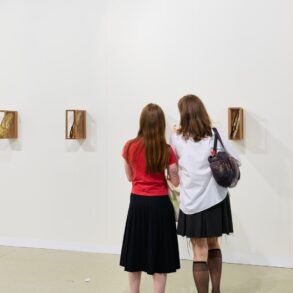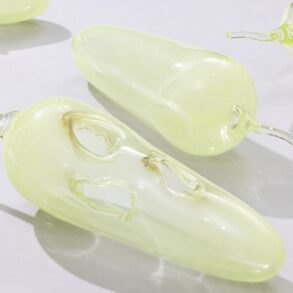
Rice University will host a Hooman Khalili original mural for the month of June.
In February, Hooman Khalili, an Iranian-born Christian artist and filmmaker, unveiled a mural at the Jerusalem Museum of Tolerance in Israel. The artwork honored two women: Shirel Haim-Pour, a 20-year-old Persian-Jewish soldier killed during the Oct. 7, 2023 Hamas attacks and Mahsa Amini, a 22-year-old Kurdish woman from Iran who died in police custody in 2022 after being arrested for allegedly violating laws requiring women to wear headscarves.
With his biblically-inspired piece, “Woman Life Freedom,” Khalili aimed to draw attention to who he sees as the modern-day Esthers—the Jewish orphan who became a Persian queen and saved her people—as symbols for “superhero” women and girls in Iran. (The mural’s title mirrors the women-led movement for women’s rights in Iran.) Khalili also sought to oppose antisemitism and highlight parts of the Bible that described a harmonious relationship between Jews and Persians.
Article continues below this ad
Now, Khalili is expected to introduce the mural during a “call to conscience” event at 4 p.m. Thursday on Rice University’s southwest Houston campus. While Rice administrators have said they’d host the installation for about a month, Khalili hopes that they will showcase the work through the year.
“I want this to inspire the Persian women of Iran to keep fighting,” Khalili told Chron on Tuesday, calling in from his home in San Francisco. He also sees it as a way to “rebuild the bridge” between Israel and Iran.
The Houston metro, one of the most culturally diverse in the U.S., is home to about 65,000 Jews and another 70,000 Iranians. In recent years, Iranian women have rallied at Houston City Hall to support protests in Iran after the death of Amini in 2022. And over the last year, a number of pro-Palestine groups have protested the Israel-Hamas war citywide, pushing limits of free speech on university campuses.
The mural has been endorsed by the State of Israel, Khalili said. He revealed that his artwork was rejected earlier this year by a number of Christian universities in the U.S. because “they were nervous about the outcome” amid anti-war protests. After speaking with the Consulate General of Houston, Khalili connected with a pair of Rice professors who agreed to sponsor him bringing the artwork to campus.
Article continues below this ad
On Tuesday, Craig Considine, who lectures on religion at Rice, announced on social media that he was “excited” to sponsor the first installation of its kind on a U.S. campus. The artist, he said, has 18 murals placed across Israel.
Hooman Khalili’s “Women Life Freedom” mural arrives on Rice University’s Houston campus on June 5.
“The mosaic mural is formed from over 14,000 mosaic tiles to honor two women whose stories have become global symbols of resistance and resilience,” Considine said in an X post. He added that the image of Haim-Pour represents the 1,200 people killed in Israel and 240 hostages taken by Hamas during the 2023 attack. “Interwoven into the mosaic are verses from Jeremiah, biblical passages that mention God placing His throne in Jerusalem and Iran (known in Jeremiah’s day as ‘Elam’),” Considine continued, “bridging sacred texts with modern calls for justice – all while uniting individuals across the Middle East and America in practical ways.”
Moshe Vardi, a computer science professor at Rice, also sponsored transporting Khalili’s mural to campus. In late 2023, Vardi wrote an opinion piece for the Houston Chronicle, titled, “Antisemitism is ‘prevalent’ on campus.”
Article continues below this ad
The art installation is set to arrive after a number of pro-Palestinian protests in Houston, including one held May 29 outside the Evelyn Rubenstein Jewish Community Center. Protestors denounced Israel’s military campaign that killed more than 54,000 Palestinians, mostly women and children, per the Associated Press. The protest developed into a chaotic scene with pro-Israel counter-protestors in an incident condemned by Jewish leaders and Council Member Abby Kamin, who is of Jewish faith.
Last year, anti-abortionists protested against a statue displayed on the University of Houston campus from February through October 2024. The artwork, titled “Witness,” was an 18-foot sculpture representing a powerful woman donning two thick braids resembling “golden ram horns” or “a crown of female potency,” Pakistani-American visual artist Shahzia Sikander explained at the time. It also honored iconic women’s rights pioneer Ruth Bader Ginsburg with a lace collar adorning the figure’s neck.
UH confirmed that the statue was deliberately decapitated on campus in July 2024 in the wake of Hurricane Beryl. Conservative protestors denounced the statue as a “satanic” display for its promotion of abortion rights.
Article continues below this ad
Asked how Khalili felt about bringing his mural to the Rice campus amid a particularly tense sociopolitical climate, he told Chron that he’d be “bummed out” if it were similarly vandalized. “It’s always a risk,” Khalili said. “But do you not do anything and just stay silent because you don’t want something to get vandalized? Or do you put it up with the hope of inspiring?”
More Religion
This post was originally published on this site be sure to check out more of their content




